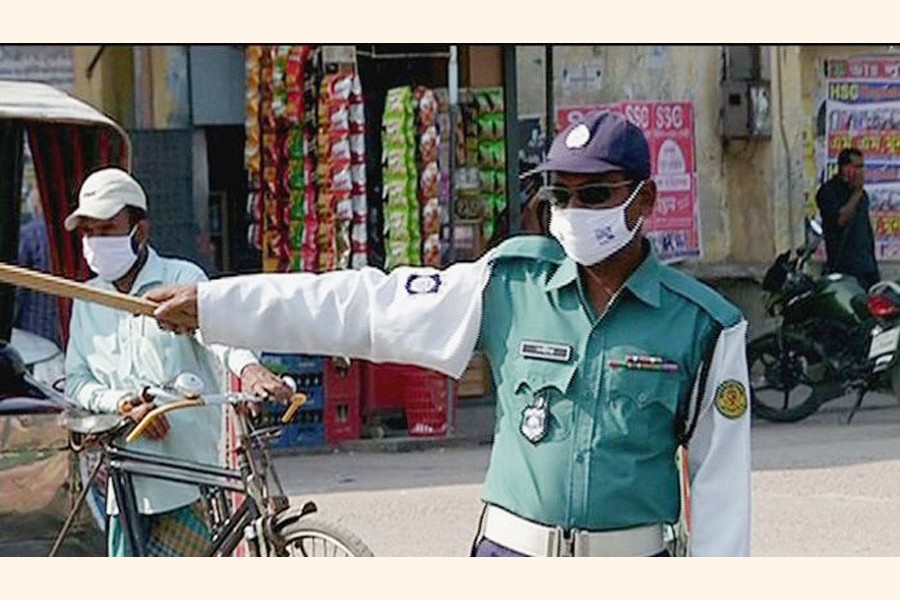
Published :
Updated :

The infinite number of stories coming daily on print, electronic and social media tell the miseries of Dhaka city dwellers whose life has become sluggish and exhausting by the perennial traffic jams which became particularly agonising during this Ramadan and after the reopening of educational institutions. In any conversation between two Dhaka dwellers, the most frequent and obvious talking point now is how clogged and pathetic life has been in Dhaka propelled by its repulsive traffic gridlock. The Dhaka commuters suffer daily; they sweat, they lose work, health, and temper, and they curse all authorities they know of -- be those related or not to traffic management. Nevertheless, at the end of the day, they do make it to their destinations 2 or 3, or 4 hours later than their planned schedule.
Sadly, Dhaka's traffic police are not that blessed; they have to stay on the streets all day to control the unfathomable congestion in the Dhaka streets. This is their job for a living. They must stay on the streets where practically nothing functions -- no one follows any rules, all foot passengers and vehicles are in a mad rush to bypass others through any or all possible means.
Traffic policing is certainly the most difficult yet most underappreciated job in Dhaka. They work for very long, erratic hours; they are always on their feet while on duty under the blazing sun, they bake in the humid heat risking their lives. Quite often they must use crude methods like punching, kicking, or flogging the drivers to exert some control over the unruly traffic. Yet in the end, they are censured by all for everything that goes wrong as if they could fix the traffic jam only if they had the honesty, competency, and willingness.
How is the environment in which the traffic police work in Dhaka-- a city considered to be one of the most uninhabitable places on the earth? Sound levels above 70 decibels (dB) are considered to be extremely hazardous by the World Health Organisation whereas 120-129 dB sounds are recorded quite often in Dhaka. An Air Quality Index (AQI) between 301 to 400 is considered hazardous for health to residents. Dhaka's AQI score was recorded at 288 in January of 2022. The AQI is based on the levels of five main pollutants -- Particulate Matter (PM10 and PM2.5), SO2 NO2, CO, and Ozone. Heatwaves (a high temperature for three consecutive days) have been quite prevalent in Dhaka. A temperature between 36-38 degrees celsius is regarded as a mild heatwave, 38-40 degrees a moderate heatwave, while a level above 40 degrees is considered an extreme heatwave. The mercury swings between 29 degrees and 34.5 degrees in Gulshan, Mirpur, Gabtoli, Goran, Basabo, Tongi, Postogola, Jurain, Hazaribagh, Jatrabari, Sayedabad, Uttara, Farmgate, and Mohakhali among many other areas.
Work is a major determinant of human health and the traffic police of Dhaka face numerous occupational hazards. They are continuously exposed to vehicular emissions and work in a very noisy and highly polluted environment. Air quality in Dhaka is very poor, particularly at traffic intersections and roadsides due to unremitting vehicular emissions containing polycyclic aromatic hydrocarbons, heavy metals, benzene, and diesel exhaust among many others.
There is enough research evidence to show that vehicular pollution causes increased morbidity and mortality. Some health effects may result from short-term exposure, while others result from long-term exposure. The majority of the studies on traffic police health have studied three specific outcomes: respiratory morbidity, cytogenic effect, and carcinogenic effect. Research has reported a decrease in lung function and increased respiratory morbidity among them. The research on the cytogenic abnormalities or the genotoxic effect of vehicular emission arising due to long-term exposure to benzene and other Polycyclic Aromatic Hydrocarbons is conclusive. Evidence is abundant on the casual association between vehicular pollution and its carcinogenic effect on the exposed population. The World Health Organisation has declared benzene as the most hazardous pollutant and recommended zero level as the only safe limit of exposure. Diesel fumes have been classified as a probable human carcinogen by the International Agency for Research on Cancer.
Traffic Police because of their standing position for very long hours develop musculoskeletal problems including back, shoulder, neck pain, or pain in the legs or hands. Dealing with very high volumes of chaotic and dense traffic makes them susceptible to emotional exhaustion as well.
According to one newspaper estimate, there are about 4,000 traffic personnel in the greater Dhaka metropolitan area and 100 of them are police women. All of them perform their duties on the streets where the traffic boxes lack toilet facilities or do not have a clean drinking water supply. Policemen may suffer from various physical problems including kidney complications since they drink less water to avoid going to the toilets. Prolonged standing posture at work and access to infrequent and poor toilet conditions may contribute to urinary system diseases.
Traffic police deal daily with a variety of exclusive situations and stressors. Working throughout the day in adverse situations creates adverse physical and psychological effects. With so heavy and highly demanding workload, they may neglect their general health and wellbeing, and at times may engage in unsafe health habits. The health hazards of the traffic police have been ignored for too long. With so many discussions on fixing Dhaka's traffic, no one ever bothered to talk about the health, safety, and wellbeing of the traffic personnel.
Hasnat M Alamgir is a Professor of Public Health


 For all latest news, follow The Financial Express Google News channel.
For all latest news, follow The Financial Express Google News channel.